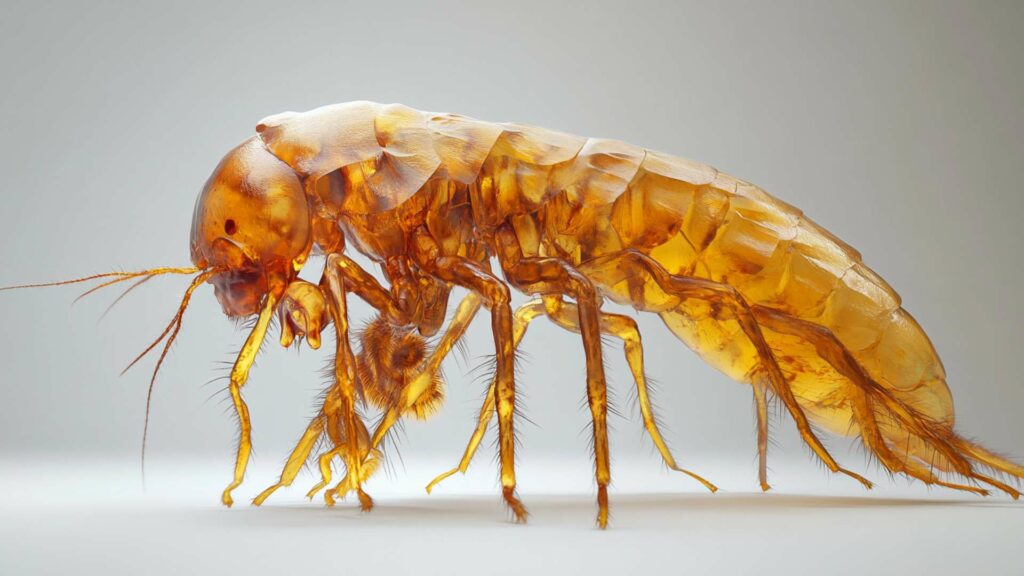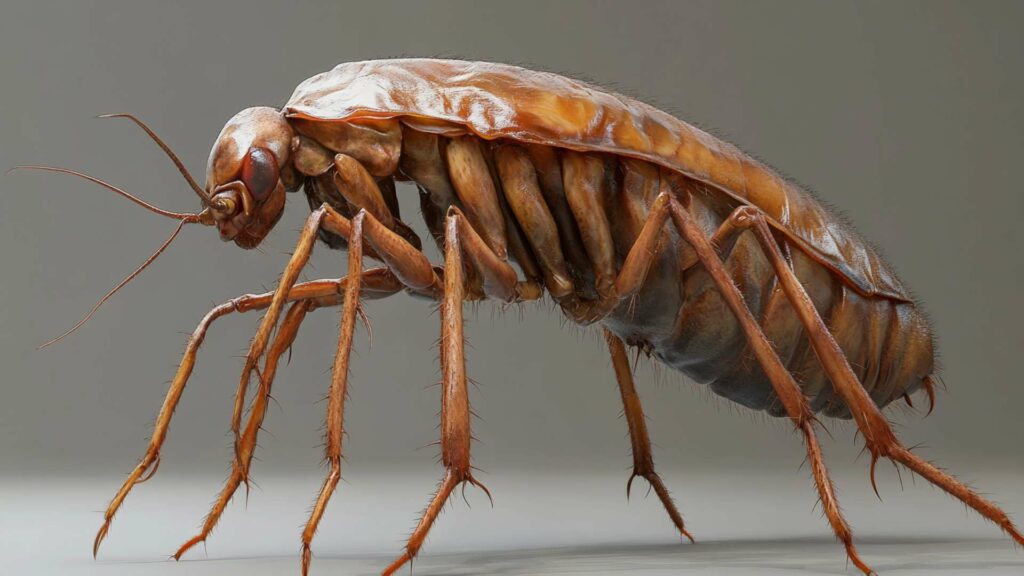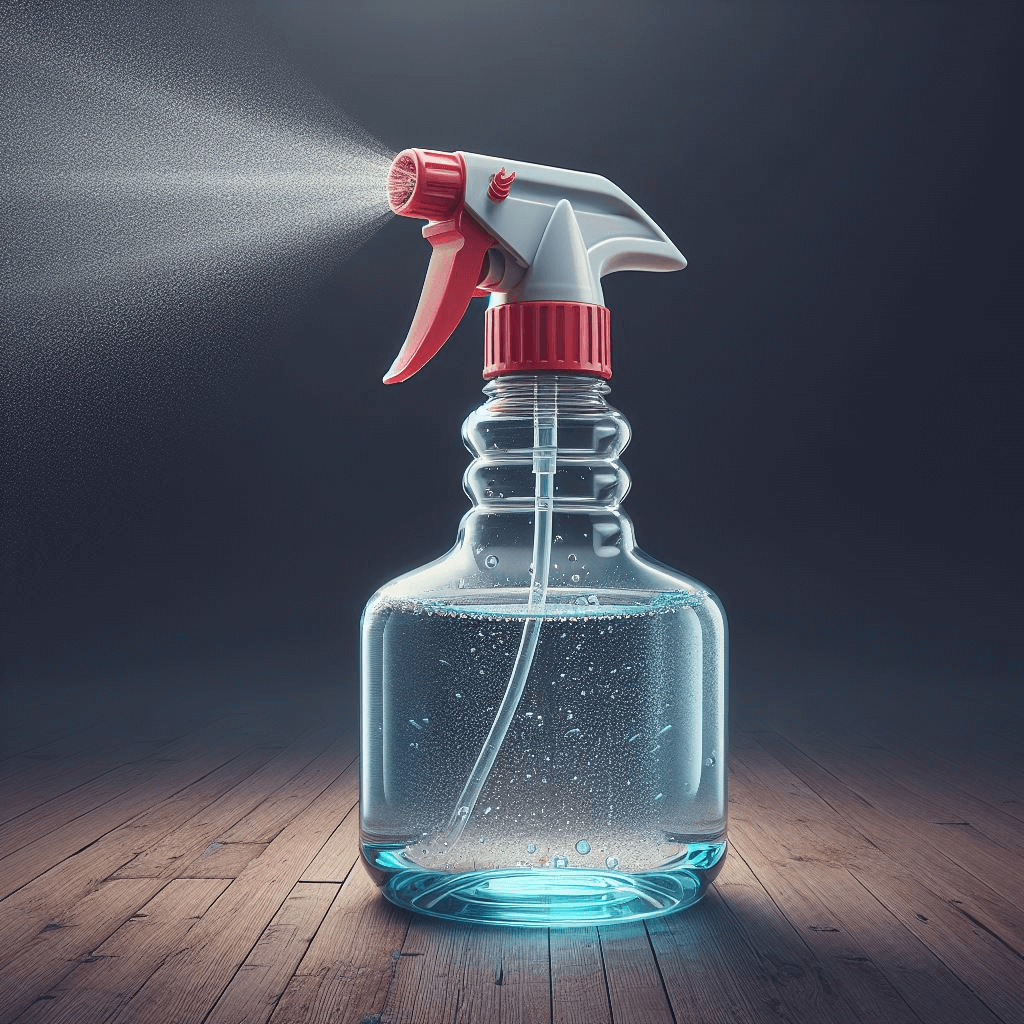Fleas, those pesky little creatures that seem to appear out of nowhere, can wreak havoc on our beloved pets and homes. Not only do they cause discomfort and incessant itching for our furry friends, but they can also infest our living spaces, making it a nightmare to get rid of them.
Thankfully, there are various flea control methods available, including homemade flea sprays and repellents that can be effective in keeping these tiny vampires at bay. The importance of flea control cannot be overstated.
It goes beyond mere annoyance; fleas can transmit diseases to both humans and animals. They multiply rapidly, with the female flea laying up to 50 eggs per day.
These eggs hatch into larvae, which then spin cocoons before emerging as adult fleas ready to feast on unsuspecting hosts. This cycle can repeat itself within a matter of weeks, turning a minor issue into a full-blown infestation.
Homemade flea sprays and repellents offer an alternative approach to combating these nuisances without resorting to potentially harmful chemicals found in some store-bought products. By using natural ingredients such as essential oils or vinegar-based solutions, pet owners have the opportunity to save money while still effectively addressing their flea problem.
Brief Overview of the Importance of Flea Control for Pets and Homes

Pets are more than just companions; they are cherished members of our families. Ensuring their well-being includes protecting them from external parasites like fleas. Flea infestations not only cause extreme discomfort for pets but can also lead to allergic reactions and secondary skin infections if left untreated.
Moreover, certain species of ticks may also hitch a ride on fleas. When fleas take hold in our homes, it becomes an uphill battle to eradicate them entirely.
They can hide in carpets, bedding, and upholstery, making it necessary to tackle the issue on multiple fronts. Achieving a flea-free environment requires a comprehensive approach that includes treating both pets and their living spaces.
Introduction to the Concept of Homemade Flea Sprays and Repellents
The idea behind homemade flea sprays and repellents is simple yet ingenious. By utilizing natural ingredients that are known to repel or kill fleas, pet owners can create non-toxic home remedies that are effective against these persistent pests. From essential oils like lavender and peppermint to vinegar and baking soda, there is an array of options available for creating your own homemade flea spray.
Not only do these homemade flea treatment solutions offer a safer alternative for our pets, but they also provide an avenue for us to have more control over what we expose our furry friends (and ourselves) to. Plus, by making these sprays at home, we can save money compared to purchasing commercial flea treatments.
So if you’re tired of battling fleas or simply want a natural approach to your flea control efforts, join us as we delve into the wonderful world of homemade flea sprays and repellents. Discover how these DIY concoctions can help protect your pets and homes from those tiny adversaries once and for all!
Understanding Fleas and Their Behavior
Explanation of the Life Cycle of Fleas
Fleas, those minuscule blood-sucking pests that seem to have an uncanny ability to annoy our beloved pets, go through a complex life cycle. Understanding this cycle is essential in combating their presence effectively. It starts with adult fleas laying eggs on their host, usually your furry friend, where they lay hundreds of tiny white eggs that are difficult to spot.
These eggs then fall off onto the ground or your pet’s bedding, creating a potential breeding ground for future infestations. Over time, these eggs hatch into larvae which hide deep within carpets or cracks in floors.
The larvae feed on organic debris like flea dirt (the tiny black droppings left behind by fleas) and other microscopic remains, gradually growing and molting several times until they spin cocoons. Within these protective cocoons, the larvae undergo metamorphosis and emerge as fully formed adult fleas.
Description of Common Signs and Symptoms of Flea Infestation in Pets
Detecting a flea infestation can be tricky since these agile critters are experts at hiding in your pet’s coat. However, there are telltale signs to look out for.
One common symptom is excessive scratching or biting at certain areas of their body, particularly around the neck and tail base region. You may also notice redness or skin irritations developing from constant itching.
Another indicator is the presence of flea dirt on your pet’s skin. Comb through their fur using a fine-toothed comb over a white surface; if you see tiny black specks that resemble pepper flakes dropping onto the surface, it’s likely flea dirt—a sure sign that fleas have made themselves at home on your furry companion.
Insight into How Fleas Spread and Thrive in Different Environments
Fleas are cunning little creatures that can thrive in various environments, not just on your pet. They have the uncanny ability to jump astonishing distances, allowing them to easily hitch a ride on unsuspecting hosts or jump from one room to another.
They can infest carpets, upholstery, and even cracks in hardwood floors. These relentless pests can also survive for extended periods without a host.
Flea cocoons are capable of lying dormant for months until ideal conditions arise. Once they sense movement or vibrations from nearby potential hosts, they emerge hungrily in search of their next blood meal.
It’s crucial to remember that fleas aren’t just pesky nuisances; they can also transmit diseases and cause discomfort for both pets and humans alike. Therefore, it’s important to take prompt action when facing a flea infestation.
Understanding the life cycle of fleas, recognizing common signs of flea infestation in your pets, and comprehending how these parasites spread lays the groundwork for effective flea control measures. Armed with this knowledge, you’ll be better equipped to combat these persistent pests and restore peace and comfort to your home.
Benefits of Homemade Flea Sprays and Repellents
Cost-effectiveness compared to commercial products
When it comes to flea control, pet owners often find themselves faced with a plethora of expensive commercial products. However, homemade flea sprays and repellents offer a cost-effective alternative. Many ingredients required for these DIY flea trap remedies are readily available at home or can be purchased at an affordable price.
For example, vinegar and water, commonly found in most kitchens, can be mixed together to create a simple yet effective homemade flea spray. This way, you can save money while still effectively combating those pesky fleas.
Avoidance of potentially harmful chemicals found in some store-bought sprays
One major advantage of homemade flea sprays and repellents is that you have full control over the ingredients used. Unlike store-bought sprays that may contain potentially harmful chemicals such as pyrethroids or organophosphates, homemade alternatives allow you to use natural ingredients that are safe for your pets and family members.
Essential oils like tea tree oil or citronella, known for their insect-repelling properties, can be diluted with water or carrier oils to create a safe yet effective solution. By avoiding harsh chemicals found in some store-bought products, you can protect both your pets and the environment.
Customization options based on individual pet’s needs
Every pet is unique, and their needs may vary when it comes to flea control. Homemade flea sprays and repellents provide the flexibility to tailor the remedies according to your pet’s specific requirements. You can experiment with different essential oils or adjust the concentration levels depending on your pet’s sensitivity or preferences.
For instance, if your cat dislikes strong scents, you can opt for milder essential oils like lavender or chamomile instead of overpowering ones like peppermint. This customization allows you to find the perfect balance between effectively repelling fleas and keeping your pet comfortable.
Homemade flea sprays and repellents offer several benefits over commercial products. They are cost-effective, utilizing ingredients that are commonly found at home or easily accessible on a budget.
By opting for natural ingredients, you can avoid potentially harmful chemicals often present in store-bought sprays, ensuring the safety of your pets and family members. Moreover, the ability to customize these remedies according to your pet’s individual needs adds an extra layer of flexibility.
So why not give these homemade flea sprays and repellents a try? By taking advantage of these simple yet effective flea home remedies now, you can get rid of fleas naturally while providing a safer environment for your beloved pets.
Essential Oils as Effective Flea Repellents
Introduction to Essential Oils for Flea Control
When it comes to keeping those pesky fleas away from our furry friends and homes, essential oils have emerged as a natural and effective solution. Some of the most popular essential oils with flea-repelling properties include lavender, peppermint, and citronella.
These versatile oils not only offer a pleasant aroma but also act as powerful insecticides against fleas. By harnessing the power of nature, pet owners can avoid the use of harmful chemicals found in some store-bought sprays and save money by creating their own homemade flea repellents.
How Essential Oils Work Against Fleas
Essential oils contain active compounds that naturally repel or even kill fleas. For instance, lavender oil contains a compound called linalool that acts as an insect repellent by disrupting the nervous system of fleas.
Similarly, peppermint oil contains menthol, which has been shown to deter fleas due to its strong scent and cooling effect on their bodies. Citronella oil emits a distinct citrusy fragrance that is highly effective in repelling not only fleas but also other pests like mosquitoes.
Specific Compounds within Essential Oils
Within essential oils, there are specific compounds responsible for their flea-repelling properties. For instance, geraniol is found in high concentrations in geranium oil and has been proven effective against fleas.
Limonene is another compound present in citrus-based oils like lemon and orange, known for its ability to kill fleas on contact by dissolving their waxy outer layers. It’s important to note that while these compounds are natural alternatives for pest control, they should be used with caution when dealing with pets.
Not all animals react the same way to essential oils, and some may be more sensitive than others. A patch test is recommended before applying essential oils to your pet’s skin, especially if they have any existing skin conditions or allergies.
Safety Precautions when Using Essential Oils on Pets
To ensure the safety of your furry friends, it is crucial to follow a few safety precautions when using essential oils for flea control. Firstly, always dilute the essential oil with a carrier oil or water-based solution before applying it to your pet’s skin. This helps to prevent any potential irritation or sensitivity.
Additionally, avoid using essential oils near their eyes, ears, or mucous membranes. When applying essential oils to your pets, start with small amounts and observe their reaction closely.
If you notice signs of discomfort such as excessive scratching or redness, discontinue use immediately and consult a veterinarian. Remember that each pet is unique and what works for one may not work for another.
By understanding the power of these natural ingredients and taking necessary precautions, you can effectively repel fleas while keeping your pets safe and comfortable. Essential oils offer a holistic approach to flea control that not only protects our furry friends but also promotes a chemical-free environment within our homes.
Recipes for Homemade Flea Sprays

Simple homemade spray using vinegar and water
One of the easiest and most effective homemade flea sprays you can make at home is a simple mixture of vinegar and water. Vinegar, with its acidic properties, helps in repelling and eliminating fleas while being safe for both pets and humans.
To create this non-toxic home remedy, mix equal parts of distilled white vinegar and water in a spray bottle. For example, if you use one cup of vinegar, add one cup of water.
Proportions for mixing vinegar and water:
To ensure the desired effectiveness of natural remedies, it is crucial to maintain the right proportions when making this homemade flea spray. The acidity of the vinegar needs to be strong enough to repel fleas but not so strong that it irritates your pet’s skin or causes any discomfort. Therefore, always remember to use equal parts of distilled white vinegar and water when preparing this solution.
Instructions on applying the spray effectively:
Applying the homemade flea spray properly is essential for optimal results. Begin by shaking the bottle well to thoroughly mix the solution.
Then, lightly mist your pet’s fur with the mixture, ensuring that you cover all areas where fleas may reside or where flea eggs might have been laid. Be cautious around sensitive areas such as eyes and ears; it’s best to avoid spraying directly on these areas altogether.
Beyond your furry friends’ bodies themselves, don’t forget to treat their living environment as well—their bedding, carpets, furniture—since fleas can hide in these places too. To apply this flea-repelling concoction around your home, simply spray it onto infested areas like pet beds or carpets where fleas are likely present.
Advanced recipe with essential oils
If you’re looking to step up your homemade flea spray game, consider incorporating essential oils into your concoction. Essential oils are not only renowned for their pleasant scents, but many also possess natural insect-repelling properties that can help keep fleas and other pests at bay.
Combination of specific essential oils with a carrier oil or water-based solution:
To create this advanced homemade flea spray, you’ll need a carrier oil such as almond oil or witch hazel, which helps dilute the essential oils and carries their aroma. Start by selecting a few drops of essential oil(s) known for their flea-repelling qualities—some popular options include lavender oil, peppermint oil, and citronella oil. Then, mix these essential oils with the carrier oil or a water-based solution to create your unique blend.
Step-by-step instructions for preparing and applying the advanced spray:
Begin by mixing 10-15 drops of your chosen essential oils into a small container filled with approximately one cup of carrier oil or water-based solution. Stir gently to ensure proper blending. When applying this advanced homemade flea spray on your pets, carefully mist their fur while avoiding contact with eyes and ears.
Pay special attention to areas where fleas tend to hide, such as the base of the tail and behind the ears. For best results, repeat this process once every few days or whenever you suspect your pet has been exposed to fleas.
Remember to store any unused portion in a cool, dark place away from direct sunlight. Regularly checking your pets for any signs of fleas—like flea dirt or itching—is important even when using homemade flea remedies, like these sprays.
By utilizing these simple recipes for homemade flea sprays using vinegar and water as well as advanced blends with essential oils, you can take control of preventing fleas from infesting both your furry friends and their living environment naturally. Not only will you save money by avoiding commercial products, but you’ll also have peace of mind knowing that you are using non-toxic home remedies to keep your pets and home free from pesky fleas.
Other Natural Ingredients with Flea-Repelling Properties
Discussion on additional natural remedies to treat fleas
When it comes to homemade flea sprays and natural flea repellents though, there are several other natural ingredients you can use to keep those pesky fleas away from your furry friends and your home. Let’s explore some of these alternatives that have shown promising flea-repelling properties.
Lemon Spray: Lemons are not just zesty and refreshing, but they can also serve as a great natural flea repellent. The acidic nature of lemons is known to repel fleas effectively. To make a lemon spray, simply boil sliced lemons in water for 15-20 minutes, let it cool, strain the liquid, and pour it into a spray bottle. Spritz this lemony solution on your pet’s bedding or areas where fleas tend to lurk.
Cedar oil: Cedar oil is derived from cedar trees and is known for its powerful pest control properties. It acts as a natural insecticide by disrupting the nervous system of adult fleas, eventually leading to their demise. Mix a few drops of cedar oil with water in a spray bottle and generously spritz it on your pet’s coat or bedding.
Lavender oil: Not only does lavender oil have a pleasant aroma that can help mask any lingering odors caused by fleas, but it also acts as an effective flea repellent. Its soothing properties can help calm irritated skin caused by flea bites too! Mix lavender essential oil with water or carrier oil (such as almond or coconut) and apply it directly onto your pet’s fur or dilute it for use around the house.
Herbal Flea Spray: Another fantastic option is creating an herbal flea spray using dried herbs such as rosemary, eucalyptus, and pennyroyal. These herbs contain natural compounds that repel fleas. Simply steep the herbs in boiling water, let it cool, strain the liquid, and pour it into a spray bottle. Spray this herbal concoction onto your pet’s coat or areas where fleas are likely to hide.
Remember, while these natural remedies can help in repelling fleas naturally, they may not eliminate a severe infestation completely. If you’re dealing with a heavy flea problem, it’s advisable to consult with a veterinarian or professional or pest control company or service to ensure effective eradication.
Conclusion
When it comes to tackling fleas naturally and safely without exposing your pets or yourself to potentially harmful chemicals found in some store-bought sprays, homemade flea sprays and repellents can be an excellent solution. By using ingredients like vinegar, essential oils like lavender and peppermint, lemon spray, and cedar oil, or even creating herbal concoctions with dried herbs known for their flea-repelling properties such as rosemary and eucalyptus; you can take proactive steps towards keeping your furry friends flea-free.
While homemade flea sprays can be effective for prevention and mild infestations, it’s important to understand that severe infestations may require additional measures such as professional pest control services or prescribed medications from your veterinarian. Regular grooming practices including regular, flea comb, baths, and washing of pet bedding will also play an essential role in maintaining a flea-free environment.
Embracing natural remedies not only helps protect our pets from harmful substances but also allows us to create a safer living space for both them and us. So say goodbye to those irritating pests by incorporating these homemade solutions into your routine!
Get Rid of Fleas with D-Termination: Las Vegas’ Leading Pest Control!

If you’re dealing with flea problems in your Las Vegas property, D-Termination is your solution. Our expert team specializes in eliminating flea infestations and restoring comfort and peace to your space. Bid farewell to fleas—opt for D-Termination for effective pest control today!
Contact us at 702-919-6310 or visit dtermination.com to book your flea control service and reclaim your space from these pesky pests.
Frequently Asked Questions:
A mixture of water, vinegar, and essential oils like lavender or peppermint is often considered an effective homemade flea spray.
Essential oils like citronella, eucalyptus, or tea tree oil can be sprayed on the body as a natural flea repellent.
Vacuuming regularly, using diatomaceous earth, and maintaining a clean environment are effective home remedies for eliminating fleas in the house.
Yes, a combination of vinegar and dawn dish soap can be used to kill fleas.








